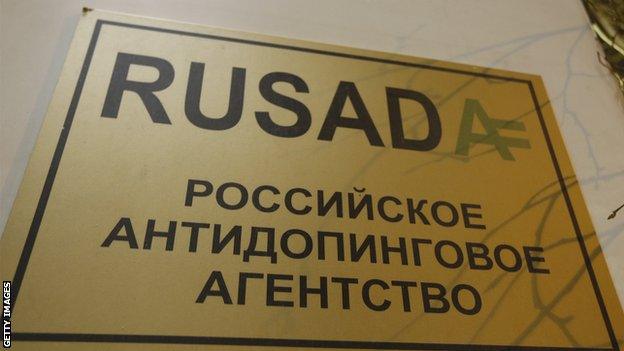World Anti-Doping Agency to gain access to Russian laboratory nine days after deadline
- Published

Leading athletes have opposed the lifting of Russia's suspension
A World Anti-Doping Agency team will access the Russian Anti-Doping Agency's laboratory in Moscow on Wednesday, nine days after an initial deadline.
Wada's inspection team were denied full access to data after Rusada was set a 31 December deadline to comply.
A three-year Wada suspension of Russian athletes was ended in September.
Wada president Sir Craig Reedie says access "will break a long impasse and will potentially lead to many cases being actioned".
Russia's failure to provide full access to the laboratory and data led to 16 national anti-doping bodies (Nados) and Wada's athlete committee to call for the country to be suspended.
The issue will be debated when Wada's compliance review committee (CRC), an independent body, meets on 14 January, after which it will make a recommendation to Wada's executive committee (ExCo).
Reedie added: "We are continuing to act on the basis of the 31 December deadline having been missed, with all the consequences that failure could bring."
US Anti-Doping Agency head Travis Tygart said: "This appears to be yet another round of the cat and mouse game between Wada and Russia we have unfortunately come to expect.
"We are all holding our breath as to how this one will end come 9 January and whether Wada will finally be given the data on the roughly 9,000 presumptive positive tests results on over 4,000 Russian athletes that hopefully has not already been destroyed by the Russians."
A report from Professor Richard McLaren in July 2016 found Russia operated a state-sponsored doping programme for four years across the "vast majority" of Olympic sports.
A subsequent report stated more than 1,000 Russian athletes benefited from doping and Russia was later banned from competing at the 2018 Winter Olympics.
Wada had insisted Russia meet two criteria before Rusada could be reinstated to competition; accept the findings of the McLaren report, and grant access to Moscow's anti-doping laboratory.
Monday's Wada statement said: "Access to, and subsequent authentication and analysis of, the data remains crucial in order to build strong cases against cheats and exonerate other athletes suspected of having participated in widespread doping on the basis of previous Wada-backed investigations."
Wada says its five-person team in Moscow could not access the necessary data between 17 and 21 December because of an issue raised by Russian authorities "in relation to the certification of the equipment under Russian law".
Wada says the issue has since been resolved by the Russian authorities.
Reedie had previously said he was "bitterly disappointed" after it was confirmed Rusada had missed the deadline and that "the process agreed by Wada's ExCo in September will now be initiated".
How the Russian doping scandal unfolded
December 2014: As many as 99% of Russian athletes are guilty of doping, a German TV documentary alleges.
November 2015: A Wada commission publishes an independent report alleging widespread corruption, amounting to state-sponsored doping in Russian track and field athletics. Rusada is declared non-compliant.
May 2016: Former Moscow anti-doping laboratory boss Grigory Rodchenkov,, external who has turned whistleblower, says dozens of Russian athletes at the 2014 Winter Olympics in Sochi had cheated.
July 2016: Russia operated a state-sponsored doping programme for four years across the "vast majority" of summer and winter Olympic sports, says a report from Professor Richard McLaren.
August 2016: International Olympic Committee (IOC) decides against imposing a blanket ban on Russian athletes at the 2016 Olympics in Rio. Individual sporting federations rule instead, with 271 Russians competing.
December 2016: Wada publishes the second part of the McLaren report which says more than 1,000 Russian athletes benefited from doping.
January 2017: Rusada and Russian sport authorities given list of criteria, external to achieve before winning back recognition.
March 2017: Wada says Russia's anti-doping reforms are not happening quickly enough.
February 2018: Russia are banned from competing at 2018 Winter Olympics in South Korea by the IOC, but 169 athletes who prove they are clean allowed to compete under a neutral flag.
May 2018: Wada writes to Rusada offering 'compromise' solution.
September 2018: News of the compromise, revealed by the BBC, prompts fury from athletes and doping bodies.
December 2018: Wada team is unable to access Moscow laboratory and data.